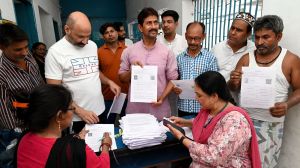Let the world not lose interest too fast
After the tsunami, that the world has come together around issues beyond economic, to issues around human concern, suggests that there is, a...

After the tsunami, that the world has come together around issues beyond economic, to issues around human concern, suggests that there is, after all, a human face to globalisation.
The focus now moves to the more daunting task of what comes next. Already, and for some days now, there have been reports of people in relief camps requesting to return to their settlements, to what was once their home. A small number of fishermen can be seen returning to the sea, in the boats that remain. Children are returning to schools, even though the half empty classrooms silently whisper the cruel fate of their classmates.
The overwhelming challenge now points to the task of rebuilding lives, not merely by putting brick on mortar, but by addressing future vulnerability. In the worst affected districts of Nagapattinum, Cuddalore, Kanyakumari and Chennai an estimated 309,379 persons have been displaced. The challenge to the global community is to sustain interest beyond charity.
Percolation of sea water has rendered most of the shallow wells saline and unsuitable for drinking while saline contamination has turned agricultural land unfit for cultivation. A standstill of fishing activities has severely affected the communities whose livelihood depends directly or indirectly on fishing. Widows of fishing families are unable to pursue earlier livelihoods, where the absence of men leaves no one to harvest the fish. Alternate water sources are being explored and community efforts are being planned to reclaim agricultural land.Mangrove re-planting has been planned. Community involvement in the rebuilding of temporary shelter is visible. Community grants, for micro projects designed and managed by the communities themselves, are similarly aimed at community control over their fuure strategies. The longer term focus is on self-help, ownership of decisions and action.
The emotional scars from the shock and loss experienced need urgent attention. We found a large number of women in Kanyakumari are still not able to talk; some talk of intrusive memories and repeated nightmares which allow little sleep at night. The loss of life, home, belongings and livelihood has left the women with an overwhelming sense of hopelessness.There is fear of the ocean and their future; despondency and grief on their loss; guilt at not being able to save others and self- accusation for the death of their children. Emotional healing, is unarguably one of the most critical aspects of the rebuilding process. Preliminary assessments in all affected district have revealed that women and girls are affected more adversely in terms of emotional and mental scars, than men. Children are under acute distress, and demonstrate expressions of trauma. They need focused inputs which will be provided through trained school teachers and others working with children. Do we have the will for a long, sustained partnership with the affected community, which moves beyond charity?
The writers are members of the NGO, CARE



- 01
- 02
- 03
- 04
- 05




























